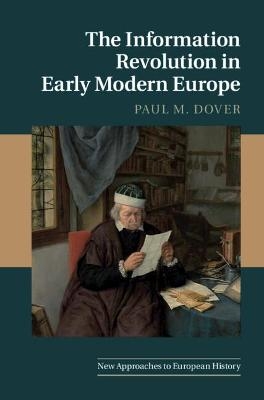
The Information Revolution in Early Modern Europe
Seiten
2021
Cambridge University Press (Verlag)
978-1-107-14753-9 (ISBN)
Cambridge University Press (Verlag)
978-1-107-14753-9 (ISBN)
This provocative new history of early modern Europe explores the 'information revolution' over the period 1450-1700, when changes in the generation, preservation and circulation of information, especially through the use of paper, had a transformative impact on political, social, cultural and economic life.
This provocative new history of early modern Europe argues that changes in the generation, preservation and circulation of information, chiefly on newly available and affordable paper, constituted an 'information revolution'. In commerce, finance, statecraft, scholarly life, science, and communication, early modern Europeans were compelled to place a new premium on information management. These developments had a profound and transformative impact on European life. The huge expansion in paper records and the accompanying efforts to store, share, organize and taxonomize them are intertwined with many of the essential developments in the early modern period, including the rise of the state, the Print Revolution, the Scientific Revolution, and the Republic of Letters. Engaging with historical questions across many fields of human activity, Paul M. Dover interprets the historical significance of this 'information revolution' for the present day, and suggests thought-provoking parallels with the informational challenges of the digital age.
This provocative new history of early modern Europe argues that changes in the generation, preservation and circulation of information, chiefly on newly available and affordable paper, constituted an 'information revolution'. In commerce, finance, statecraft, scholarly life, science, and communication, early modern Europeans were compelled to place a new premium on information management. These developments had a profound and transformative impact on European life. The huge expansion in paper records and the accompanying efforts to store, share, organize and taxonomize them are intertwined with many of the essential developments in the early modern period, including the rise of the state, the Print Revolution, the Scientific Revolution, and the Republic of Letters. Engaging with historical questions across many fields of human activity, Paul M. Dover interprets the historical significance of this 'information revolution' for the present day, and suggests thought-provoking parallels with the informational challenges of the digital age.
Paul M. Dover is Professor of History at Kennesaw State University. He has published widely in the political, diplomatic and cultural history of late medieval and early modern Europe, and in the history of information. He is the author of the Changing Face of the Past (2013) and the editor of Secretaries and Statecraft in the Early Modern World (2016).
1. Introduction: worlds of paper; 2. European paper; 3. 'Ink-Stained fingers': the information of commerce and finance; 4. The paper of politics and the politics of paper; 5. Revolutionary print; 6. The book of nature and the books of man; 7. Writing others and the self; 8. Conclusion: information revolutions, past and present.
| Erscheinungsdatum | 02.06.2021 |
|---|---|
| Reihe/Serie | New Approaches to European History |
| Verlagsort | Cambridge |
| Sprache | englisch |
| Maße | 156 x 233 mm |
| Gewicht | 630 g |
| Themenwelt | Geschichte ► Allgemeine Geschichte ► Neuzeit (bis 1918) |
| Geisteswissenschaften ► Geschichte ► Regional- / Ländergeschichte | |
| Sozialwissenschaften ► Kommunikation / Medien ► Buchhandel / Bibliothekswesen | |
| ISBN-10 | 1-107-14753-0 / 1107147530 |
| ISBN-13 | 978-1-107-14753-9 / 9781107147539 |
| Zustand | Neuware |
| Informationen gemäß Produktsicherheitsverordnung (GPSR) | |
| Haben Sie eine Frage zum Produkt? |
Mehr entdecken
aus dem Bereich
aus dem Bereich
Giordano Bruno - ein ketzerisches Leben
Buch | Hardcover (2024)
C.H.Beck (Verlag)
CHF 41,85
das dramatische 16. Jahrhundert
Buch | Hardcover (2024)
Rowohlt Berlin (Verlag)
CHF 47,60


